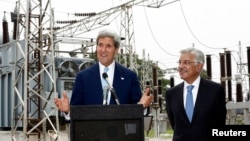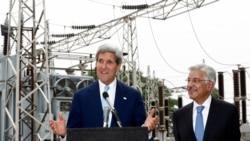The United States is committed to the development of a prosperous Pakistan. Critical to Pakistan’s advancement, said U.S. Special Envoy and Coordinator for International Energy Affairs Carlos Pascual, “is the ability to create jobs, a sense of hope for its people. And nothing is more fundamental to that than the role of energy.”
One of the things the United States has done, through the U.S. Agency for International Development, since 2009, is contribute to Pakistan’s energy supply, which has increased over 1000 megawatts worth of power generation within the country and provides electricity to 16 million people, said Ambassador Pascual:
“We’ve helped them put in meters so they can better understand where power is being generated, where it is being taken off, how to respond to it, and how to find solutions to be able to deal with those issues.”
Another critical step to expanding energy production in Pakistan will be the privatization of some power distribution companies by 2015, said Ambassador Pascual. Governments themselves cannot achieve levels of investment necessary to generate and distribute electricity. So, bringing in the private sector as a partner is absolutely key, he said.
With regard to natural gas, the U.S. announced it will help Pakistan identify actions that could increase production and maximize recovery from existing gas fields as well as identify new areas for conventional gas development. This will help meet the country’s increasing energy demand, especially for power generation.
Pakistan is also pursuing alternative energy with U.S. support. The Overseas Private Investment Corporation, the U.S. government’s development finance institution, also known as OPIC, is in the process of negotiating a $95 million loan to a prospective wind power plant in southeastern Pakistan and is considering support for several others.
The United States will continue to support Pakistan in its pursuit of reliable, diversified, and affordable energy.
One of the things the United States has done, through the U.S. Agency for International Development, since 2009, is contribute to Pakistan’s energy supply, which has increased over 1000 megawatts worth of power generation within the country and provides electricity to 16 million people, said Ambassador Pascual:
“We’ve helped them put in meters so they can better understand where power is being generated, where it is being taken off, how to respond to it, and how to find solutions to be able to deal with those issues.”
Another critical step to expanding energy production in Pakistan will be the privatization of some power distribution companies by 2015, said Ambassador Pascual. Governments themselves cannot achieve levels of investment necessary to generate and distribute electricity. So, bringing in the private sector as a partner is absolutely key, he said.
With regard to natural gas, the U.S. announced it will help Pakistan identify actions that could increase production and maximize recovery from existing gas fields as well as identify new areas for conventional gas development. This will help meet the country’s increasing energy demand, especially for power generation.
Pakistan is also pursuing alternative energy with U.S. support. The Overseas Private Investment Corporation, the U.S. government’s development finance institution, also known as OPIC, is in the process of negotiating a $95 million loan to a prospective wind power plant in southeastern Pakistan and is considering support for several others.
The United States will continue to support Pakistan in its pursuit of reliable, diversified, and affordable energy.






